Unfortunately, many of our furry friends suffer from joint issues as they age (and some even suffer from them while they’re still young).
This is obviously pretty rotten news for Rover, but there are a number of ways you can help your marvelous mutt manage his symptoms and promote healthy joints. You’ll want to work closely with your vet to devise a good overall treatment strategy, but one of the critical components of your overall joint-care plan should usually include feeding your pooch a food designed to nurture his ailing joints with key ingredients like joint-friendly compounds.
Below, we’ll share a few of the best dog food for joint health picks and discuss some of the other things you can do to help protect your pet’s joints!
What Makes a Dog Food Good for Joint Health?
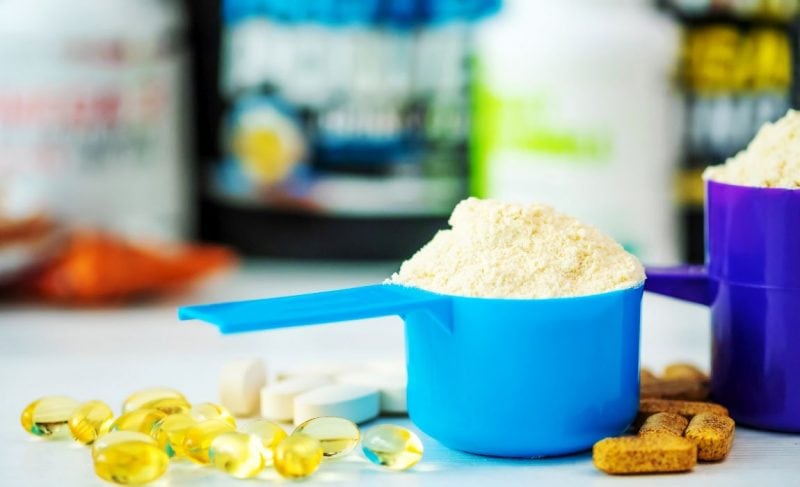
Wondering what makes a food good for supporting joint health and mobility in dogs? Here are three things to look for when looking for the right joint-friendly food for your furry companion:
- The best foods for joint health are fortified with joint-supporting supplements. Ideally, your dog’s diet should include joint-supporting nutrients like glucosamine and chondroitin. Other helpful ingredients for healthy joints include omega-3s (often provided in the form of fish oil supplements) and taurine to help manage canine inflammation.
- The best foods for joint health feature an appropriate calcium to phosphorus ratio. Your pooch not only needs to consume enough calcium and phosphorus, he must also get them in the proper ratio for optimal nutrition for healthy bones and joints. This is especially important for large breed dogs, and it’s also one of the leading reasons vets discourage the use of homemade diets.
- The best foods for joint health encourage your pooch to maintain a healthy body weight. Extra pounds put unnecessary pressure on your dog’s joints, so it’s imperative that his diet promotes a healthy body weight. Prevent excessive weight gain in your beloved companion by feeding proper amounts of a balanced diet made with lean meat, real produce, and wholesome carbohydrates. If all else fails, try a weight management recipe.
- The best foods for joint health often feature type II collagen to combat pain and inflammation. Derived from chicken or cows, this protein comes from connectives tissues and potentially triggers the body to produce pain and inflammation-fighting chemicals that may aid in mutt mobility. Its benefits aren’t fully understood yet, but type II collagen is often featured in arthritis supplements for people and pets alike.
- The best foods for joint health may feature hyaluronic acid. Hyaluronic acid occurs naturally as a fluid in eyes and joints, cushioning and lubricating these areas for comfortable movement. At least one study has shown oral supplementation of hyaluronic acid to benefit dogs recovering from cranial cruciate ligament surgery.
While you’ll want to look for foods that meet the specific criteria discussed above, it’s still important to select a food that satisfies all of the general dog-food-selection criteria all owners should consider.
Check out our complete guide to picking a dog food to learn more, but a few of the most important criteria include things like picking a food that meets the AAFCO guidelines for your dog’s life stage, limiting your choices to foods that are cooked in the USA, and seeking a food that appeals to your pup’s palate.
Additionally, always make sure your vet is on board with the food you select.
The 5 Best Dog Food for Joint Health Picks

Now that you know what to look for in a joint-supporting dog food, we can talk about some of our favorite high-quality dog food choices. Here are the best foods to support joint health. Just remember that you need to work with your vet to devise a comprehensive joint-care plan and make sure he or she gives the green light to the joint health dog food you select.
1. Merrick Healthy Grains Lamb + Brown Rice
About: Despite being a mainstream food that’s not specifically marketed as a joint-supporting recipe, Merrick Healthy Grains Lamb + Brown Rice is a great choice for dogs needing help with joint mobility with its rich blend of glucosamine, chondroitin, and omega-3s. Grain-inclusive, this crunchy canine cuisine includes a blend of brown rice, barley, and oatmeal to energize your gem of a pooch and calm rumblings between meals. You’ll also find quinoa, an ancient seed that’s a solid source of fiber and protein.
Features:
- Real lamb is the first listed ingredient, joined later by protein-rich salmon and lamb meals to support muscle strength
- Cooked in Merrick’s own US kitchens using globally sourced ingredients
- Fresh produce, including apples and carrots, provide natural fiber, flavor, and vitamins
- Added taurine supports a healthy heart
Joint-Supporting Compounds:
- Chondroitin Sulfate: 800 milligrams per kilogram (minimum)
- Glucosamine: 800 milligrams per kilogram (minimum)
- Omega-3 Fatty Acids: 0.75% minimum
Ingredients List
Deboned Lamb, Salmon Meal, Brown Rice, Barley, Oatmeal...,
Pros
- Fortified with three different joint-supporting ingredients (chondroitin, glucosamine, and omega-3s)
- Probiotics promote healthier digestive function
- Taste gets a tail wag from most dogs
- Free of legumes, potatoes, and peas
Cons
- Multi-protein recipe may be a bad choice for dogs with food allergies
- Pricing is on the higher side
2. Blue Buffalo Prescription Mobility Support
A veterinarian-designed prescription diet that's formulated with joint supplements and a ton of Omega-3s.
About: Some pups need a little more joint support than over-the-counter dry dog food can provide, which is where Blue Buffalo’s W+M Recipe comes in handy. You’ll need a prescription to order this dry food, but this salmon and chicken recipe is worth the effort, as it’s fortified with high levels of omega-3 fatty acids, glucosamine, and chondroitin to nourish joint cartilage and ease inflammation. As a weight management formula, it’s also a great dog food to help a dog lose weight and ease unnecessary stress on joints. Rounding things out, Blue’s patented LifeSource Bits give canine immune systems a boost.
Features:
- Deboned salmon is the primary ingredient, followed by protein-rich chicken meal to support lean muscle development
- Formulated by veterinarians and animal nutritionists to aid in canine joint health and weight management
- Made in the USA using globally acquired ingredients
- A fiber-rich recipe, this food promotes proper digestive function
Joint-Supporting Compounds:
- Chondroitin Sulfate: 550 milligrams per kilogram (minimum)
- Glucosamine: 700 milligrams per kilogram (minimum)
- Omega-3 Fatty Acids: 2% (minimum)
Ingredients List
Deboned Salmon, Chicken Meal, Pea Protein, Powdered Cellulose, Peas...,
Tapioca Starch, Natural Flavor, Pea Starch, Flaxseed (source of Omega 3 Fatty Acids), Fish Oil (source of EPA-Eicosapentaenoic Acid), Gelatin, Cranberries, Dried Tomato Pomace, Canola Oil (source of Omega 6 Fatty Acids), Shrimp Meal (source of Glucosamine), Potassium Sulfate, Pea Fiber, Choline Chloride, Potassium Chloride, Betaine Hydrochloride, Calcium Chloride, DL-Methionine, Dehydrated Alfalfa Meal, Chicken Fat (preserved with Mixed Tocopherols), Dried Chicory Root (source of Soluble Fiber), Taurine, Calcium Sulfate, Potatoes, Turmeric, Pomegranate, Alfalfa Nutrient Concentrate, L-Threonine, Dicalcium Phosphate, Calcium Carbonate, L-Tryptophan, Vitamin E Supplement, L-Ascorbyl-2-Polyphosphate (source of Vitamin C), Sweet Potatoes, Carrots, L-Carnitine, Zinc Amino Acid Chelate, preserved with Mixed Tocopherols, Iron Amino Acid Chelate, Chondroitin Sulfate, Garlic, Vegetable Juice for color, Salt, Blueberries, Barley Grass, Parsley, Dried Kelp, Yucca Schidigera Extract, Copper Amino Acid Chelate, Manganese Amino Acid Chelate, Niacin (Vitamin B3), Calcium Pantothenate (Vitamin B5), L-Lysine, Biotin (Vitamin B7), Vitamin A Supplement, Zinc Sulfate, Ferrous Sulfate, Thiamine Mononitrate (Vitamin B1), Riboflavin (Vitamin B2), Vitamin D3 Supplement, Vitamin B12 Supplement, Pyridoxine Hydrochloride (Vitamin B6), Calcium Iodate, Dried Yeast, Dried Enterococcus faecium fermentation product, Dried Lactobacillus acidophilus fermentation product, Dried Aspergillus niger fermentation extract, Dried Trichoderma longibrachiatum fermentation extract, Dried Bacillus subtilis fermentation extract, Copper Sulfate, Folic Acid (Vitamin B9), Manganese Sulfate, Sodium Selenite, Oil of Rosemary.
Pros
- Several owners reported improved mobility, energy levels, and weight loss after switching to this food
- Most dogs absolutely loved the taste of this dry dog food (which isn’t always the case with prescription diets)
- Formulated by experts with a careful balance of nutrients to combat unnecessary canine weight gain and promote cartilage repair and joint health
Cons
- Like most prescription diets, this food is relatively pricey
- Mixed-protein, grain-free diets not great for every dog
- Some dogs eat around the LifeSource Bits
3. Blue Buffalo Large Breed Chicken & Rice
About: In addition to having nutritional requirements that differ from small and medium-sized dogs, many large-breed pups are particularly susceptible to joint issues that can greatly impact canine quality of life. Fortunately, there are options — such as Blue Buffalo Large Breed Chicken & Rice — a dry dog food designed specifically for big dogs that’s a protein-rich, grain-inclusive dog food recipe. In addition to glucosamine, chondroitin, and omega-3s, this recipe is made with an array of impressive ingredients to support your pet’s overall wellbeing with essential nutrients for nose-to-tail health.
Features:
- Real, deboned chicken is the primary ingredient, followed by protein-dense chicken meal to support strong muscles
- Prebiotics and probiotics aid in doggy digestive health
- Made in the USA with global ingredients
- Blue Buffalo’s antioxidant-packed LifeSource Bits offer immune support
- Free of common allergens like artificial colors, flavors, and preservatives
Joint-Supporting Compounds:
- Chondroitin Sulfate: 500 milligrams per kilogram (minimum)
- Glucosamine: 700 milligrams per kilogram (minimum)
- Omega-3 Fatty Acids: 0.75% (minimum)
Ingredients List
Deboned Chicken, Chicken Meal, Brown Rice, Oatmeal, Barley...,
Pea Starch, Peas, Natural Flavor, Flaxseed (Source of Omega 3 And 6 Fatty Acids), Pea Fiber, Chicken Fat (Preserved with Mixed Tocopherols), Pea Protein, Fish Oil (Source of Epa-Eicosapentaenoic Acid), Dehydrated Alfalfa Meal, Potassium Chloride, Dicalcium Phosphate, Calcium Carbonate, Salt, Potatoes, Dried Chicory Root, Alfalfa Nutrient Concentrate, Choline Chloride, Taurine, Dl-Methionine, Preserved with Mixed Tocopherols, Vitamin E Supplement, Sweet Potatoes, Carrots, Glucosamine Hydrochloride, Garlic, L-Carnitine, Zinc Amino Acid Chelate, Zinc Sulfate, Vegetable Juice For Color, Ferrous Sulfate, Iron Amino Acid Chelate, Blueberries, Cranberries, Barley Grass, Parsley, Turmeric, Dried Kelp, Yucca Schidigera Extract, Niacin (Vitamin B3), Calcium Pantothenate (Vitamin B5), L-Ascorbyl-2-Polyphosphate (Source of Vitamin C), L-Lysine, Copper Sulfate, Biotin (Vitamin B7), Vitamin A Supplement, Copper Amino Acid Chelate, Manganese Sulfate, Chondroitin Sulfate, Manganese Amino Acid Chelate, Thiamine Mononitrate (Vitamin B1), Riboflavin (Vitamin B2), Vitamin D3 Supplement, Vitamin B12 Supplement, Pyridoxine Hydrochloride (Vitamin B6), Calcium Iodate, Dried Yeast, Dried Enterococcus Faecium Fermentation Product, Dried Lactobacillus Acidophilus Fermentation Product, Dried Aspergillus Niger Fermentation Extract, Dried Trichoderma Longibrachiatum Fermentation Extract, Dried Bacillus Subtilis Fermentation Extract, Folic Acid (Vitamin B9), Sodium Selenite, Oil of Rosemary.
Pros
- Loaded with joint-supporting supplements and inflammation-fighting omega-3s
- Features a bounty of high-quality ingredients, including real produce
- Proper calcium to phosphorus ratio for large breed dogs
- Fortified with five probiotic strains for digestive health
Cons
- More protein options would be ideal for doggos with meat allergies
- Some dogs pick around the LifeSource Bits
4. Hill’s Diet Prescription Joint Food
About: It’s important to watch your woofer’s weight if he’s suffering from joint problems and mobility issues, as extra pounds put extra stress on joints, affecting everything from your dog’s activity level to his overall quality of life. Fortunately, this specialized food from Hill’s Diet is designed to support your dog’s joint health with glucosamine and chondroitin while helping portly pups slim down a bit with a calorie-conscious recipe. Just note that this is a prescription dog food, so you’ll need approval from your veterinarian before the food is shipped to your doorstep.
Features:
- Protein-rich chicken meal is the primary ingredient, supporting muscle strength
- Designed by experts to support weight and joint management in dogs
- Omega-3s from flaxseed and fish oil combat inflammation and nourish your pup’s skin and coat
- Rich source of fiber from grains, fruits, and vegetables, which aids doggy digestion
- Made in the USA with globally sourced ingredients
Joint-Supporting Compounds:
- Chondroitin Sulfate: 500 milligrams per kilogram (minimum)
- Glucosamine: 400 milligrams per kilogram (minimum)
- Omega-3 Fatty Acids: 2% (minimum)
Ingredients List
Chicken Meal, Brewers Rice, Pea Fiber, Whole Grain Corn, Corn Gluten Meal, Flaxseed...,
Soybean Mill Run, Dried Tomato Pomace, Powdered Cellulose, Wheat Gluten, Dried Beet Pulp, Chicken Liver Flavor, Fish Oil, Coconut Oil, L-Lysine, Lactic Acid, Pork Liver Flavor, Potassium Chloride, DL-Methionine, Iodized Salt, Carrots, Dicalcium Phosphate, vitamins (Vitamin E Supplement, L-Ascorbyl-2-Polyphosphate (source of Vitamin C), Niacin Supplement, Thiamine Mononitrate, Calcium Pantothenate, Pyridoxine Hydrochloride, Vitamin A Supplement, Biotin, Vitamin B12 Supplement, Riboflavin Supplement, Folic Acid, Vitamin D3 Supplement), Lipoic Acid, Choline Chloride, Calcium Carbonate, minerals (Manganese Sulfate, Ferrous Sulfate, Zinc Oxide, Copper Sulfate, Calcium Iodate, Sodium Selenite), Taurine, Glucosamine Hydrochloride, L-Carnitine, Mixed Tocopherols for freshness, Natural Flavors, Chondroitin Sulfate, Beta-Carotene
Pros
- Owners reported that even picky eaters seemed to enjoy this recipe
- Some owners report improvements in canine weight and energy levels after switching to this food
- Unlike Blue Buffalo’s prescription diet, this is a grain-inclusive recipe, suiting pawrents concerned about the potential safety issues of grain-free diets
Cons
- Doesn’t include any whole meat protein, instead relying on meat meals, like chicken meal
- As a prescription diet, this dry dog food is relatively expensive
5. JustFoodForDogs Joint & Skin Support
About: Unfortunately, not many of the leading fresh dog food brands are specifically designed to support joint health, but JustFoodForDogs picks up the slack with their delicious Joint & Skin Support recipe. This meaty mash includes omega-3 fatty acids from fish oil help banish inflammation and condition your canine’s skin and coat, plus chondroitin to support healthy cartilage between joints. Type II collagen is also included to benefit your barker’s frame. Made to meet the AAFCO nutrient profile for maintenance, this recipe features a single animal protein source, suiting sniffers with meat allergies.
Just look under JustFoodForDogs’ fresh frozen options to find this joint-happy medley of meat, quinoa, and vegetables.
Features:
- Real pork is the primary ingredient
- JustFoodForDogs’ recipes are formulated by veterinarians and board-certified animal nutritionists
- Meal plans are customized to your canine companion’s needs, including body condition, breed, age, and any food allergies
- Meals are fresh-frozen and shipped to your doorstep — just thaw and serve
- JustFoodForDogs’ recipes are made using human-grade ingredients and no preservatives in US-based kitchens you can visit
Joint-Supporting Compounds:
- Chondroitin Sulfate: 100 milligrams to 400 milligrams per meal (depending on canine weight)
- Omega-3 Fatty Acids: 0.06% (minimum)
Ingredients List
Pork, Quinoa, Kale, Carrots, Apples...,
Fish Oil, Calcium Carbonate, Dicalcium Phosphate, Hydrolyzed Chicken Cartilage (source of collagen), Salt, Taurine, Zinc Amino Acid Chelate, Choline Chloride, Vitamin E Supplement, Selenium Yeast, Ferrous Fumarate, Copper Amino Acid Chelate, d-Calcium Pantothenate, Vitamin B12 Supplement, Cholecalciferol (source of Vitamin D3), Riboflavin, Potassium Iodide
Pros
- Contains omega-3-rich fish oil to help reduce joint inflammation
- Chondroitin nourishes cartilage between joints
- Flavor is a high point with most pooches
- Focused ingredient list of human-grade goodies a win for dogs with food sensitivities
Cons
- Like all fresh foods, JustFoodForDogs’ meals are expensive
- Requires refrigeration
What Kinds of Joint Problems Do Dogs’ Suffer?
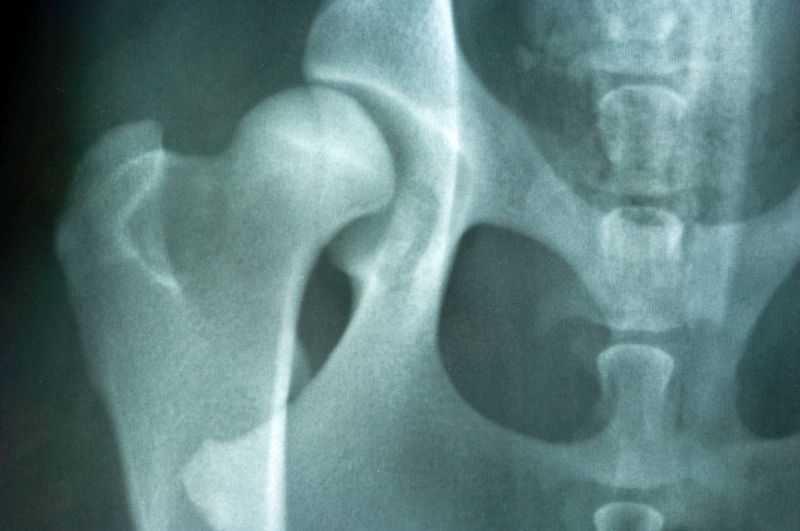
Unfortunately, joint problems are fairly common in dogs. Here are some of the more common conditions that your pooch may experience:
- Arthritis: Arthritis (technically termed osteoarthritis) is characterized by the chronic inflammation and degeneration of the cartilage in a dog’s joints. While thought to be a senior ailment, arthritis pain can affect dogs of any age.
- Dysplasia: Dysplasia occurs when a dog’s joint does not fit correctly into its socket, causing abnormal growth, inflammation, and lameness. Elbow and hip dysplasia are common in canines, including big and small barkers, like bulldogs, pugs, and German shepherds.
- Luxating Patella: A luxating patella is when a dog’s kneecap moves out of place. This is more common in smaller breeds, like toy poodles, Pomeranians, and Chihuahuas.
- Osteochondrosis: This condition occurs as a result of abnormal cartilage development in large breed dogs, including Labrador retrievers and Rottweilers. A key way to avoid this issue is to feed a large-breed puppy food for dogs expected to be 70 pounds or more in adulthood.
- Trauma: Dislocation, fractures, and cruciate ligament tears can all lead to joint problems for pooches, as injuries may affect everything from cartilage health to connective tissues to bone strength. Proper veterinary care and careful recovery are vital.
The takeaway? Joint problems for dogs can stem from a variety of issues. So, it’s important to see a veterinarian to determine the underlying cause of your pooch’s problems so that you can properly address the issues at hand, whether it involves a joint health food for dogs, supplement sources of glucosamine, or other measures.
Are Some Breeds More Susceptible to Joint Problems Than Others?

Some breeds are more susceptible to joint issues than others based on their build and genetic predisposition. A couple of those breeds include:
- American pit bull terrier (and other bully breeds)
- German shepherd
- Dachshund
- Labrador retriever
- Great Dane
- Mastiff
- St. Bernard
- Rottweiler
- Golden retriever
- Cavalier King Charles spaniel
- Bernese mountain dog
Regular exercise is important to maintaining muscle strength, but your dog’s exercise routine can also lead to joint issues, including canine arthritis. Improper exercise can lead to joint woes in dogs of any breed, age, or size, but especially in giant dog breeds like mastiffs and Great Danes. With these pups, sticking to low-impact exercises during puppyhood is vital for healthy joint development.
Signs and Symptoms of Joint Pain in Dogs

Are you unsure whether your dog is struggling with joint pain? Concerned about canine arthritis or other uncomfortable conditions?
Here are some telltale signs that your dog may be dealing with joint discomfort:
- Limping
- Lameness
- Inability to move
- Lethargy
- Excessive licking of one or more joints
- Yelping when touched
- Swollen joints
- Muscle loss
- Irritability
- Hopping when running
- Slowing down or lack of interest in activities
- Stiffness
- Reluctance to participate in regular exercise, even walking
If your pooch is experiencing one or more of these symptoms, it’s time to head to the veterinarian. Even with veterinary intervention, special attention may be needed in mitigating safety issues around the home for dogs with joint issues, such as gating off stairways and lying down carpet runners on hardwood areas to prevent falls.
How Are Joint Problems Treated for Dogs?

There are a number of ways to address joint problems, which you’ll need to discuss with your vet. However, in many cases, feeding a dog food that supports good joint health is a valuable component of your approach.
Your veterinarian may provide additional support for Spot through the following methods:
- Supplements: Joint support supplements can be a preventative measure for at-risk pups and also help dogs with joint issues feel their best. The two most common supplements are glucosamine and chondroitin. They come in tablets, chewables, powders, and liquids and are an excellent choice if your dog has sensitivities that make switching his food a no-go.
- Medications: Your pooch may be prescribed medication to help cope with chronic pain or inflammation, especially if he’s dealing with ongoing canine arthritis. Hiding medication in a pill pocket makes administering it a breeze.
- Physical Therapy: Physical therapy can help strengthen a pooch’s joints and range of motion and is especially a great option for pups who aren’t eligible for surgical intervention.
- Management Solutions: Your veterinarian may recommend several lifestyle adjustments to limit your dog’s pain. This could include diet changes or adjustments to your pup’s usual routine or exercise plan. There are a vast array of arthritis treatment solutions for dogs, but a common first step is to work on management options like reducing stairs access, adding ramps to the home, and utilizing back waist slings.
- Surgery: In some cases, surgical intervention – such as an ACL surgery, may be able to correct the source of your furball’s joint issues. Your Rover will also have a road to recovery ahead, so prepare to play doggy nurse and get ready to pour on the TLC.
- Weight Loss: Your dog’s joint issues could be caused or exacerbated by excess weight. Weight loss can help alleviate some of your dog’s symptoms and make for a happier furry friend. Increased exercise and a diet change may be in order, whether it’s cutting down on portions of his existing food or switching to a calorie-controlled food featuring high-quality protein sources to aid in lean muscle development.
FAQ: Best Dog Food for Joint Health Picks
Still have questions about canine joint health and how the right food can help? Check out the most commonly asked questions surrounding the topic and the matching answers with us.
What is the best dog food for joint health?
The best dog food for joint health varies dog to dog, but the top choices are all rich in the cartilage-condition compounds glucosamine and chondroitin and feature anti inflammatory omega-3 fatty acids. The nutritional benefits of this trio of ingredient to your doggo’s joints are unmatched.
The most important aspects when looking for the best fit for your floof are that the food meets your pup’s AAFCO nutrient profile for his current life stage, addresses any health issues he has (including joint concerns,) and has your vet’s approval. Secondary characteristics worthy of consideration include the food’s country of origin, primary ingredient, and use of high-quality protein sources.
What foods help dog joints?
The best dog foods for joint mobility and support are those made with joint-nourishing compounds like glucosamine and chondroitin sulfate and inflammation-fighting omega-3 fatty acids. These essential nutrients offer a multi-pronged approach to helping joints by aiding the existing cartilage within joints, promoting regeneration of cartilage, and battling any inflammation that may lead to impaired mobility and pain.
What foods are good for old dogs joints?
The best nutrition for senior joint needs is specialized dog food rich in glucosamine, chondroitin, and omega-3 fatty acids. These specialized diets contain much more of these joint-friendly compounds than regular dog food and are typically formulated by veterinary nutritionists and other experts to benefit your canine’s frame while still providing key nutrients.
Senior dog food recipes are geared toward balanced nutrition that tackles mature mutt health issues and special dietary concerns, such as joint support, healthy digestion, and strong bones. Opting for one of these for your senior sniffer may be best to ensure nose-to-tail health.
How much glucosamine do dogs needs?
Glucosamine dosage varies by your dog’s weight and needs, with the larger the dog, the more glucosamine required.
The general rule of thumb with adult dogs is:
– Dogs between 5 and 20 pounds need 250 milligrams to 500 milligrams daily
– Dogs weighing between 20 to 45 pounds need 500 milligrams daily
– Dogs that weigh between 45 and 90 pounds need 1,000 milligrams daily
– Dogs weighing more than 90 pounds should have at least 1,500 milligrams daily
Consult with your vet to determine the proper amount for your pooch. Most dry dog food feature an appropriate dosage for doggos, but it’s still important to check what your individual woofer needs.
Do omega-3s help joint health?
In addition to supporting your canine’s skin, coat, eyes, and brain, omega-3 fatty acids are known for anti inflammatory properties that can benefit joints, especially pups with canine arthritis or those recovering from heavy physical activity. One study even showed a decrease in acids linked to cartilage destruction in dogs fed a fish oil supplement rich in omega-3 fatty acids. Fish oil, including salmon oil, and flaxseed are great natural sources of omega-3s.
Unfortunately, plenty of pooches are affected by joint issues at some point in their lives. Thankfully, these joint supportive dog foods can help your furry friend feel his best while managing his joint problems.
Does your dog suffer from joint issues? Has your pooch tried any of these joint-friendly foods? We’d love to hear all about it in the comments below!

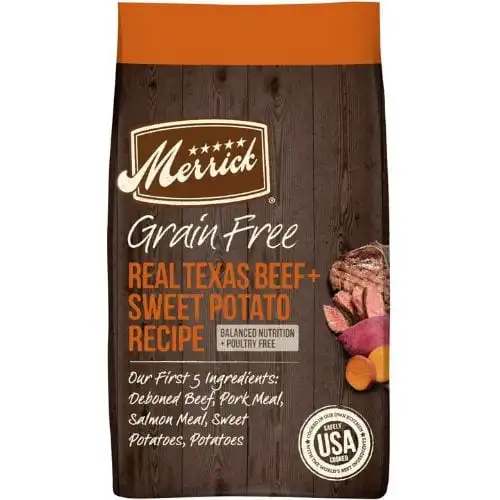
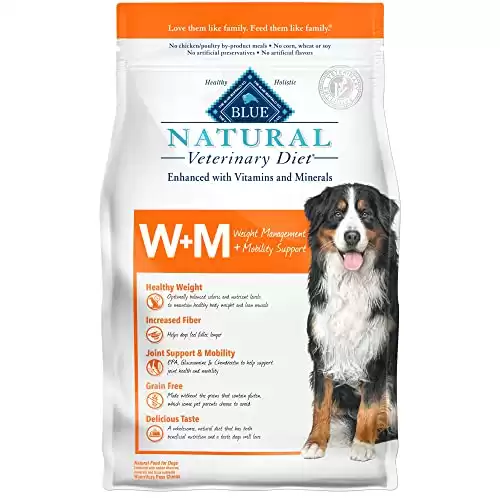

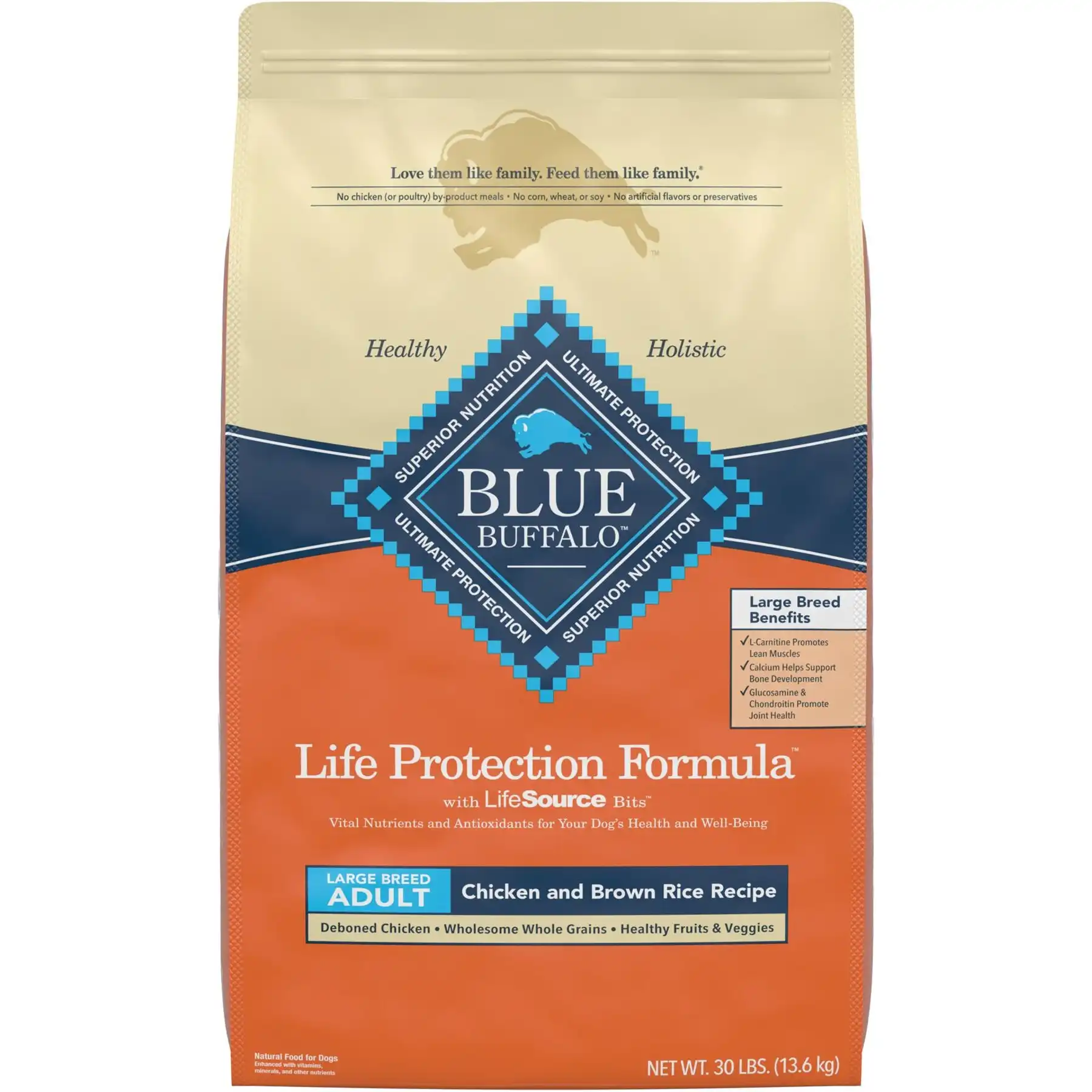














Leave a Comment